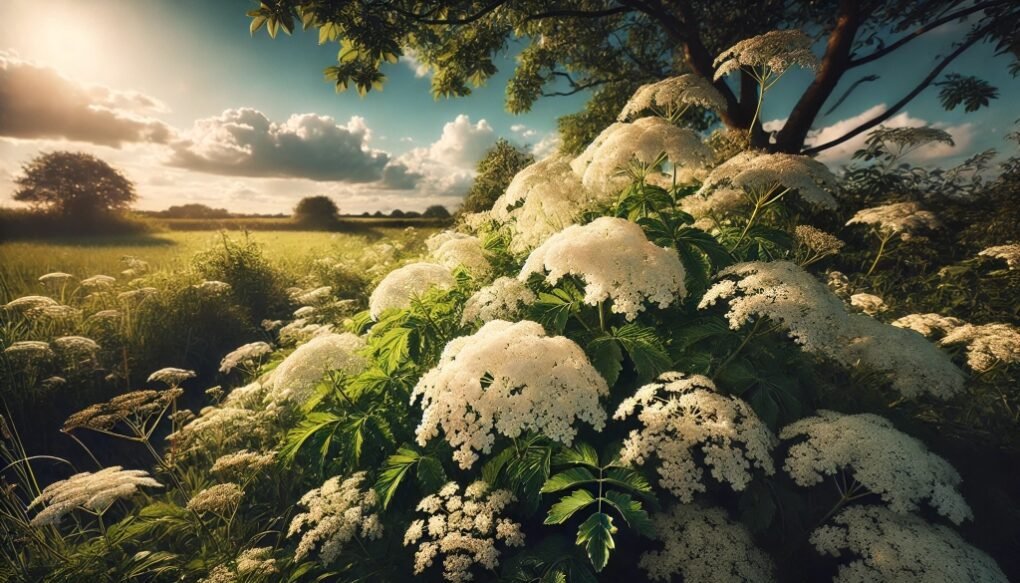Elderflower is a delicate, aromatic bloom known for its versatility in health, beauty, and culinary applications. Harvested from the elder tree, these blossoms have a rich history rooted in traditional medicine and folklore. Today, elderflower is embraced for its numerous benefits, making it an essential ingredient in natural remedies, skincare products, and culinary delights.
What is Elderflower?
Elderflower comes from the elder tree (Sambucus), which is native to Europe, North America, and parts of Asia. The tree produces clusters of small, white flowers that bloom in late spring to early summer. These flowers carry a unique fragrance and have been used for centuries in various traditions, particularly for their medicinal properties. Elderflower is often harvested and dried to make herbal teas, syrups, and other health supplements.
Elderflower is prized not only for its health benefits but also for its subtle flavor, which has made it a popular ingredient in beverages like cordial and even spirits like gin. The elder tree is also known for its berries, but it is the flowers that provide a range of health and culinary uses.
The Health Benefits of Elderflower
Elderflower is rich in bioactive compounds, such as flavonoids, that are beneficial for the immune system. These compounds help protect the body from oxidative stress, which is linked to chronic illnesses. The flowers are known for their anti-inflammatory, antiviral, and antimicrobial properties, which make elderflower a popular remedy for various ailments.
Immune System Support
Elderflower is frequently used to combat cold and flu symptoms. Its antiviral properties are particularly effective in reducing the severity and duration of these illnesses. Elderflower tea or syrup is often consumed to alleviate respiratory issues such as sinus congestion and sore throat.
Skin Health and Anti-aging
Elderflower contains antioxidants that help protect the skin from free radical damage. These antioxidants slow down the aging process by maintaining skin elasticity and reducing the appearance of fine lines and wrinkles. As a result, elderflower is a common ingredient in natural skincare products, offering anti-aging and anti-inflammatory benefits.
Digestive Health
Traditionally, elderflower has been used to relieve digestive issues. Its mild diuretic and laxative properties help in cleansing the system, while also providing relief from bloating and constipation. Elderflower is sometimes included in herbal blends designed to promote gut health.
Culinary Uses of Elderflower
Beyond its medicinal properties, elderflower is cherished for its light, floral flavor. This unique taste has made it a favored ingredient in various culinary creations, ranging from refreshing beverages to baked goods.
Elderflower Cordial
Elderflower cordial is perhaps the most well-known use of this blossom. This sweet, fragrant syrup can be mixed with sparkling water to create a refreshing drink or added to cocktails for a floral twist. Making elderflower cordial at home is relatively simple, requiring only a few ingredients: elderflowers, sugar, lemon, and water. The result is a delightful syrup that can be stored for several weeks.
Elderflower in Desserts
Elderflower is often incorporated into desserts to add a subtle floral note. It pairs well with ingredients like lemon and berries, making it a popular choice for cakes, tarts, and ice creams. It can be infused into creams or syrups, providing a delicate, aromatic flavor that enhances many dessert recipes.
Elderflower Liqueur
In the world of spirits, elderflower liqueur has gained popularity for its versatility in cocktails. It can be used to add a sweet, floral note to drinks such as gin and tonics, martinis, and spritzers. It liqueur complements both citrus and herbal flavors, making it a staple in many cocktail recipes.
Elderflower in Skincare
Elderflower’s benefits extend beyond health and food, as it is widely used in natural beauty products. Its antioxidant and anti-inflammatory properties make it an excellent choice for skincare, offering protection and nourishment to the skin.
Anti-inflammatory Benefits
Elderflower’s natural anti-inflammatory properties make it ideal for calming irritated or inflamed skin. It is often found in creams, lotions, and toners aimed at soothing conditions like eczema and psoriasis. It helps reduce redness and swelling, providing relief for sensitive skin.
Antioxidant Protection
The high antioxidant content in it helps to neutralize free radicals that contribute to skin aging. When applied topically, elderflower can protect the skin from environmental stressors, such as pollution and UV radiation. This protection aids in maintaining a youthful complexion, free from premature signs of aging.
Natural Astringent
It has astringent qualities that help tighten the skin, minimizing the appearance of pores. It also helps balance oily skin by regulating the production of sebum, making it a popular ingredient in toners and facial mists designed for acne-prone skin.
Growing and Harvesting Elderflower
Growing it at home is relatively easy, as the elder tree is hardy and adaptable to various climates. Elder trees can be grown in gardens or pots, and they thrive in well-drained soil with plenty of sunlight.
Planting Elder Trees
Elder trees should be planted in spring or fall, with enough space to accommodate their growth. They can grow up to 30 feet tall, but they can also be pruned to maintain a smaller size. Elder trees prefer full sunlight, though they can tolerate partial shade.
Harvesting Elderflowers
Elderflowers should be harvested in late spring to early summer when they are in full bloom. The flowers should be picked early in the day when their fragrance is most potent. It’s important to use fresh, fragrant elderflowers for culinary and medicinal purposes, as they lose their flavor and potency quickly after being picked.
Precautions When Using Elderflower
While it offers numerous benefits, it’s important to note that certain parts of the elder tree, including the leaves, stems, and unripe berries, contain toxic compounds. Only the flowers and fully ripe berries are safe for consumption. Additionally, it should be used in moderation, especially for those with allergies or who are pregnant. Always consult with a healthcare provider before using it as a medicinal remedy.
Moreover, it is a remarkable plant with a broad range of uses in health, beauty, and cuisine. Its light, floral taste makes it a popular ingredient in beverages and desserts, while its antioxidant and anti-inflammatory properties make it a valuable addition to skincare routines. Whether you’re enjoying elderflower cordial on a warm summer day or applying elderflower-infused skincare, this versatile blossom offers numerous benefits that can enhance your daily life.










